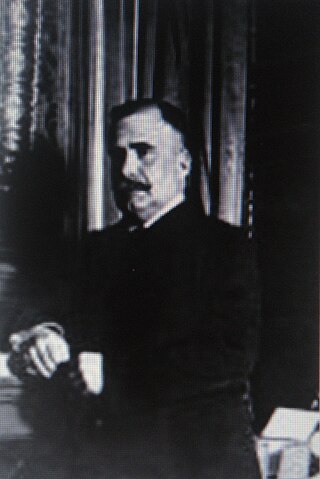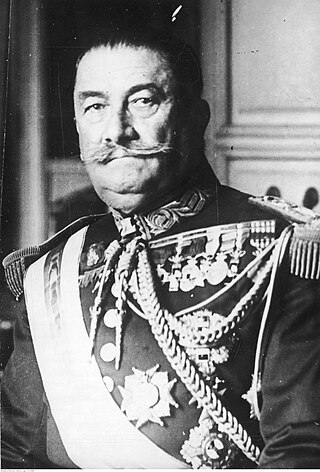This article needs additional citations for verification .(February 2024) |
| |||||
| Decades: | |||||
|---|---|---|---|---|---|
| See also: | Other events of 1918 List of years in Spain | ||||
Events in the year 1918 in Spain .
This article needs additional citations for verification .(February 2024) |
| |||||
| Decades: | |||||
|---|---|---|---|---|---|
| See also: | Other events of 1918 List of years in Spain | ||||
Events in the year 1918 in Spain .
Manuel Garcia may refer to:

Infante Alfonso of Spain, Prince of the Two Sicilies, Duke of Calabria was one of two claimants to the title of the head of the House of Bourbon-Two Sicilies from 1960 until his death in 1964. Alfonso was the son of Prince Carlos of Bourbon-Two Sicilies (1870–1949) and his wife, María de las Mercedes, Princess of Asturias (1880–1904). He was born and died in Madrid, Spain.

Manuel García Prieto, 1st Marquis of Alhucemas was a Spanish politician who served as prime minister several times in his life and as the 30th Solicitor General of Spain. He was a member of the Liberal Party. During his last term, he was deposed by Miguel Primo de Rivera.
Prieto is a surname of Spanish origin. Notable people with the surname include:
Amar en tiempos revueltos, is a Spanish television period soap opera that originally ran on La 1 of Televisión Española for seven seasons, from 27 September 2005 to 16 November 2012, set in the times of the Spanish civil war and Francoist Spain.

Santiago Alba y Bonifaz was a Spanish politician and lawyer. He served as Minister of the Navy, Minister of Education and Science, Minister of the Interior, Minister of Housing, and Minister of Foreign Affairs during the reign of Alfonso XIII.

Juan Alvarado y del Saz was a Spanish lawyer and politician.
The Liberal Party, originally called Liberal Fusionist Party until 1885, was a Spanish political party created in 1880 by Práxedes Mateo Sagasta. With the Conservative Party of Antonio Cánovas del Castillo, it formed a two-party system of alternating governments, the turno, which characterised the Spanish Restoration during the late 19th century and the early 20th century.
Events in the year 1912 in Spain.
Events in the year 1952 in Mexico.
Events in the year 1915 in Spain.
Events in the year 1917 in Spain.
Events in the year 1922 in Spain.
Events in the year 1923 in Spain.

The Alhucemas landing was a landing operation which took place on 8 September 1925 at Alhucemas by the Spanish Army and Navy and, in lesser numbers, an allied French naval and aerial contingent, that would put an end to the Rif War. It is considered the first amphibious landing in history involving the use of tanks and massive seaborne air support. Alhucemas is seen as a precursor of the Allied amphibious landings in World War II, and the first successful combined operation of the 20th century.

José Francos Rodríguez was a Spanish politician and journalist. He served as Mayor of Madrid as well as Minister of Public Instruction and Fine Arts and Minister of Grace and Justice during the reign of Alfonso XIII.

The Dictablanda of Dámaso Berenguer, or Dámaso Berenguer's dictatorship was the final period of the Spanish Restoration and of King Alfonso XIII’s reign. This period saw two different governments: Dámaso Berenguer’s government, formed in January 1930 with the goal of reestablishing “constitutional normalcy” following Primo de Rivera’s dictatorship, and President Juan Bautista Aznar’s government, formed a year later. The latter paved the way to the proclamation of the Second Spanish Republic. The term dictablanda was used by the press to refer to the ambivalence of Berenguer’s government, which neither continued the model of the former dictatorship nor did it fully reestablish the 1876 Constitution.
Events in the year 1899 in Spain.